In a world of war crimes

Kanisa George
How do we make sense of war? How do we conceptualise the disruptions of civilian life and the complete and utter disregard for history and culture?
It's easy to flick through the pages of time and observe the world turn on a much quicker axis due to the onslaught of war and a way of life that took decades to reconstruct. From the comfort of our living rooms, we watch as the red army invade Warsaw on the BBC's presentation of World on Fire and as Brad Pit put on an epic performance in Inglorious Bastards. But for those of us cringing at the horror of the present-day world, war and its criminal side is far from easy to understand.
Over the last few days, it has become apparent that "Putin's war" has entered into new territory. In the minds of many, the acts of the Russian delegation have gained the status of war crimes.
"It is a war crime to attack a nuclear power plant," the US embassy in Kyiv said on its Twitter page last week. "Putin's shelling of Europe's largest nuclear plant takes his reign of terror one step further."
The former Ukrainian prime minister Arseniy Yatsenyuk made it very clear to the Council on Foreign Relations that Putin is a war criminal who has to sit behind the bars of the International Criminal Court.
To the average man, the mere act of mounting troops and invading Ukraine amounts to crimes of aggravation and everything else that follows. Yet amid these terms hovering dangerously over the scene at Mariupol, many question what can be done in the short-term to stop it.
War crimes and crimes of aggression fall within the jurisdiction of the International Criminal Court (ICC). Along with genocide and crimes against humanity, the ICC is mandated to try individuals (rather than states) and hold such persons accountable for these offences viewed as a serious concern to the international community.
Known as the first treaty-based permanent international criminal court, the ICC was established by the 1998 Rome Statute with more than 120 signatories. One of the court's main objectives is to end impunity and hold those responsible for their crimes.
In the wake of Russia's invasion of Ukraine, chief prosecutor of the ICC Karim Ahmad Khan, launched an investigation of war crimes and crimes against humanity allegedly committed by Russia.
There is no doubt that these acts can also be viewed as acts of aggression by Russia, but in this case, they aren't being investigated as it does not fit the requirements set out by the Rome Statute. The statute follows that the court can only prosecute crimes of aggression if one member state commits an act of aggression against another. And since neither Russia nor Ukraine is a member, crimes of aggression in this scenario can't be prosecuted.
Crimes against humanity according to the Rome Statute include any of the following acts committed as part of a widespread or systematic attack directed against any civilian population with knowledge of the attack. This includes murder, extermination and the crime of apartheid. War crimes on the other hand include grave breaches of the Geneva Conventions and other serious violations of the laws and customs applicable in international armed conflict and in conflicts "not of an international character," when they are committed as part of a plan or policy or on a large scale. These prohibited acts include mutilation, cruel treatment and torture, and intentionally directing attacks against civilians.
It goes without saying that specifically targeting civilian populations, targeting specific groups of people and violating the Geneva convention could be classified as war crimes. Moreover, over the last few days, Russia has been criticised for its intended use of cluster bombs and thermobaric weapons, which many assert flies in the face of the Geneva convention.
One writer stressed, that even if there's a military necessity, there's a clear obligation upon parties to a conflict to not use disproportionate force and refrain from weapons that leave a significant footprint in heavily populated areas.
But is it even possible to prosecute a power as might as Putin?
In 2016, Russia formally withdrew its signature from the founding statute of the ICC. But even though Russia signed the Rome statute in 2000, it had not ratified the treaty and thus remained outside the ICC's jurisdiction. The ICC does not conduct trials in the absence of the accused, which essentially means that for Putin to face any charges, he would have to be handed over by Russia or arrested outside of Russia.
And if there is anything we know about the powerhouse that is Vladimir Putin, this scenario is implausible. So, what, according to some writers, is the point?
With the many atrocities that exist throughout the world, the ICC acts as a beacon of hope but is that all it really is?
Not only has it seen the prosecution of more than a handful of matters and has shed light on heinous violations of human rights, it has also sent a very clear signal that such acts would not be condoned. But critics argue that its merely an illusion as most countries are more than equipped to deal with matters of this nature within their jurisdiction and with several powerful states refusing to join, justice as in the case of Ukraine might not always be achieved.
It's easy for us to pinpoint war crimes and those of an inhumane nature, but in the case of Ukraine, is that all that could be done about it?


Comments
"In a world of war crimes"